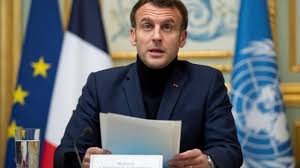In a remarkable demonstration of international support, France’s recently announced humanitarian aid package marks a critical step in addressing Lebanon’s escalating crisis. Unveiled during a high-level conference in Paris, the initiative highlights the urgent need for coordinated global assistance to help Lebanon cope with severe humanitarian challenges, ongoing military tensions, and institutional instability.
Humanitarian Crisis and Global Response
Lebanon’s deepening crisis has drawn unprecedented international concern, prompting over 70 countries and international organizations to convene for the Paris conference. The country is grappling with a severe humanitarian emergency, compounded by economic collapse and political instability. According to the International Organization for Migration, approximately 800,000 people are currently displaced, many of them seeking refuge in overcrowded shelters or fleeing across the border to Syria. This mass displacement has overwhelmed Lebanon’s already fragile healthcare system and strained its capacity to provide basic services.
France’s leadership in spearheading this aid effort has been pivotal, with the initiative aiming to address Lebanon’s immediate needs while fostering a comprehensive international response. The French-led aid package, which focuses on both short-term relief and long-term structural support, is seen as essential in stabilizing the country. Alongside France, other European nations have committed significant financial resources, including Italy’s pledge of 10 million euros and Germany’s commitment of 60 million euros. Together, these contributions are working toward the United Nations’ urgent funding goal of $426 million, which aims to alleviate Lebanon’s most pressing humanitarian concerns.
Beyond immediate financial aid, this international response signals a broader commitment to supporting Lebanon in the face of its many challenges. The funding will not only help address critical shortages in food, medicine, and shelter but will also provide support for Lebanon’s collapsing public services, particularly healthcare and education. These efforts are vital to ensure that the country does not slip further into chaos and that the most vulnerable populations receive the help they desperately need.
Strategic Security and Institutional Support
In addition to humanitarian relief, France and its international partners have recognized the critical importance of bolstering Lebanon’s security infrastructure. A significant portion of the French initiative is aimed at enhancing the capabilities of Lebanon’s armed forces, which are crucial to maintaining stability in the region. Lebanon’s army, currently composed of roughly 80,000 troops, faces significant challenges in defending the country, especially in the south, where only 5,000 troops are deployed. This limited capacity leaves Lebanon vulnerable, particularly as Hezbollah continues to operate with considerable autonomy in certain regions, effectively acting as a state within a state.
The French aid package includes provisions to upgrade Lebanon’s aging military equipment and provide resources that will allow the army to operate more efficiently across the country. These efforts are essential to enabling the Lebanese armed forces to maintain territorial integrity and respond to security threats, especially in light of ongoing regional tensions. Strengthening Lebanon’s military infrastructure is seen as a critical step in stabilizing the country and ensuring that it can protect its borders and maintain internal order.
Furthermore, the international community, including France, Italy, and Spain, has reiterated its support for the United Nations Interim Force in Lebanon (UNIFIL), a peacekeeping mission consisting of 10,500 troops stationed in the region. European nations contribute a significant portion of these forces, with one-third of UNIFIL’s troops coming from Europe. The Italian delegation, in particular, has emphasized the need to reinforce UNIFIL’s capabilities to address the evolving security challenges on the ground.
These security measures reflect the multifaceted approach required to stabilize Lebanon. Humanitarian aid alone cannot solve the country’s complex problems. By enhancing both military and institutional capacity, the French-led initiative seeks to create the conditions necessary for long-term stability, ensuring that Lebanon can navigate its way out of the current crisis.
Looking Ahead: A Model for International Support
The success of France’s humanitarian aid initiative and the broader international response will be crucial in determining Lebanon’s future. As the country faces intertwined crises—ranging from economic collapse and political instability to security threats and mass displacement—the global support spearheaded by France represents a lifeline. However, the implementation and effectiveness of this aid package will be closely monitored by the international community in the coming months, as the situation on the ground remains fluid.
In addition to providing immediate relief, this international aid effort has the potential to influence regional stability and shape diplomatic relations. Lebanon’s strategic importance in the Middle East, combined with its internal complexities, means that any successful intervention could serve as a blueprint for addressing similar crises in other parts of the world. By coordinating resources and expertise, the international community has demonstrated that collective action is possible even in the face of seemingly insurmountable challenges.
France’s role as a leading voice in this effort underscores the importance of continued engagement with Lebanon, not only in terms of financial and military support but also in fostering diplomatic solutions to the country’s internal conflicts. This coordinated response offers a glimmer of hope for Lebanon’s future, as international efforts converge to address the root causes of its current predicament.
Strengthening the Global South
As Lebanon continues to grapple with an overwhelming humanitarian crisis, France’s leadership in providing critical aid offers a much-needed lifeline. The French-led initiative, supported by other international partners, has the potential to stabilize the country by addressing both immediate needs and long-term structural challenges. The focus on strengthening Lebanon’s security infrastructure, coupled with a commitment to humanitarian relief, reflects a comprehensive approach to crisis management.
On this path, the global response to Lebanon’s crisis could serve as a model for international cooperation in addressing complex humanitarian and security issues. The success of these efforts will not only determine Lebanon’s ability to overcome its current challenges but could also shape future international strategies for managing similar crises in other parts of the world. As the global South rises, coordinated responses like this will be vital in maintaining regional stability and supporting vulnerable nations in times of need.
Related News
















